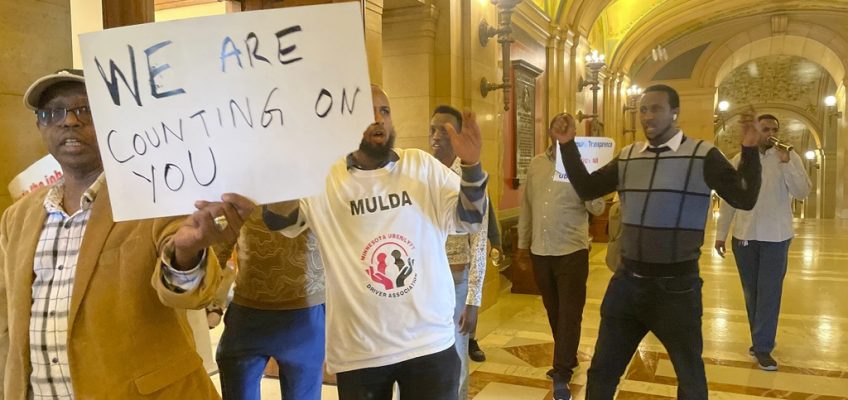As the midnight deadline approached, it remained to be seen late Sunday whether Minnesota lawmakers would take a step toward putting abortion rights in the state Constitution and pass a minimum wage deal for ride-hailing drivers that would end Uber and Lyft’s threats to leave the state.
The 2024 legislative session appears to be closing in on a sputtering end, with many major bills failing to reach the finish line, including a roughly $900 million infrastructure bonding bill and a legal sports betting proposal.
End-of-session negotiations have failed to produce a deal on infrastructure, with Republicans refusing to support a borrowing bill unless Democratic-Farmer-Labor lawmakers concede to a list of demands that include dropping an abortion rights amendment and a gun control proposal.
DFLers did meet some of the GOP demands, such as providing funding for rural emergency medical services and sending religious liberty protections to the governor’s desk. But they still moved forward with the abortion rights amendment, killing the possibility of a bonding deal, which can only pass with a supermajority.
Minnesota’s Legislature doesn’t technically have to do anything this year. Lawmakers passed a two-year budget in 2023, so there’s no risk of a government shutdown. But action on items like bonding and abortion rights may have to wait until the Legislature reconvenes in 2025.
Here’s the status of some of the major items remaining before lawmakers as the Legislature approaches adjournment.
ERA amendment
House DFLers on early Sunday morning passed a bill that would plot a path to place for abortion rights in Minnesota’s Constitution by putting the question to voters in 2026. But it does not appear to have a good chance of making it through the Minnesota Senate before midnight.
Sen. Majority Leader Erin Murphy, DFL-St. Paul, told reporters she thinks she has the votes to pass the measure, but there might not be enough time. The DFL has a one-seat majority in the Senate.
The Senate passed a version of the Equal Rights Amendment last year, but it does not include House language that would put the right to an abortion and protections for LGBTQ people in the state Constitution.
Originally the House was slated to vote on the bill last Monday, but DFL representatives tabled the bill for nearly a week as Republicans gave extended floor speeches on other bills. DFLers accuse GOP lawmakers of delay tactics, but Republicans deny that, saying the matter could have come up months ago.
Uber/Lyft
Members of the House debated a bill to set a minimum wage for Uber and Lyft drivers late Sunday. The Senate is also expected to take up the bill.
DFL lawmakers and Minnesota Gov. Tim Walz reached a compromise on minimum wages for ride-hailing drivers that could stop Uber and Lyft’s threats to end service in the state on July 1. The House continued work on the proposal Sunday night and the Senate was expected to take it up later on.
The bill came after weeks of uncertainty about whether the Minnesota Legislature would preempt a minimum wage ordinance approved by the Minneapolis City Council that triggered the ride-share companies’ threats to leave in the first place.
Under the agreement, which ride-share companies say they back, the per-mile pay rate for drivers would be $1.28 per mile and 31 cents per minute.
Bonding
Minnesota passes its budgets in odd-numbered years and in even-numbered years it traditionally passes a public infrastructure borrowing bill known as a bonding bill.
But that likely won’t be the case this year, as Republicans are refusing to help pass a bonding bill unless DFLers concede to a list of demands including dropping the ERA. Bonding is one of their points of leverage because a borrowing bill requires a three-fifths majority to pass.
There isn’t a huge difference between the DFL and GOP bonding proposals. DFLers initially pitched an infrastructure package of around $980 million that’s mostly borrowing combined with around $39 million from the general fund. Republicans proposed about $890 million with $30 million in cash.
Sports betting
While backers of legal sports betting continued projecting optimism on Sunday, the already low odds of a bill making it to the governor’s desk this year only continued to drop as adjournment approached.
Neither the House nor the Senate have passed a sports betting bill, and each chamber would likely pass a different version. Some DFLers in the Senate want a version of the bill that includes protections against problem gambling, presenting another hurdle for legalization.
To get a version of the bill without strong limits on sports betting, DFLers would need Republican votes, and some Republicans have said they’re not interested in a sports betting bill without compromises on other issues.
Related Articles
DFLers say they’ve reached a deal on minimum wage for Uber, Lyft drivers
Joe Soucheray: We’ve been burned before. So, some questions about that $100 million, Governor
Minnesota House vote delayed on constitutional amendment on abortion, other rights
Familiar playbook as GOP tries to break DFL trifecta in MN
Markus Flynn: Beyond Brown — the unfinished journey toward educational equity


Leave a Reply